Dictionary Browser Extension: More Than an Online Translator
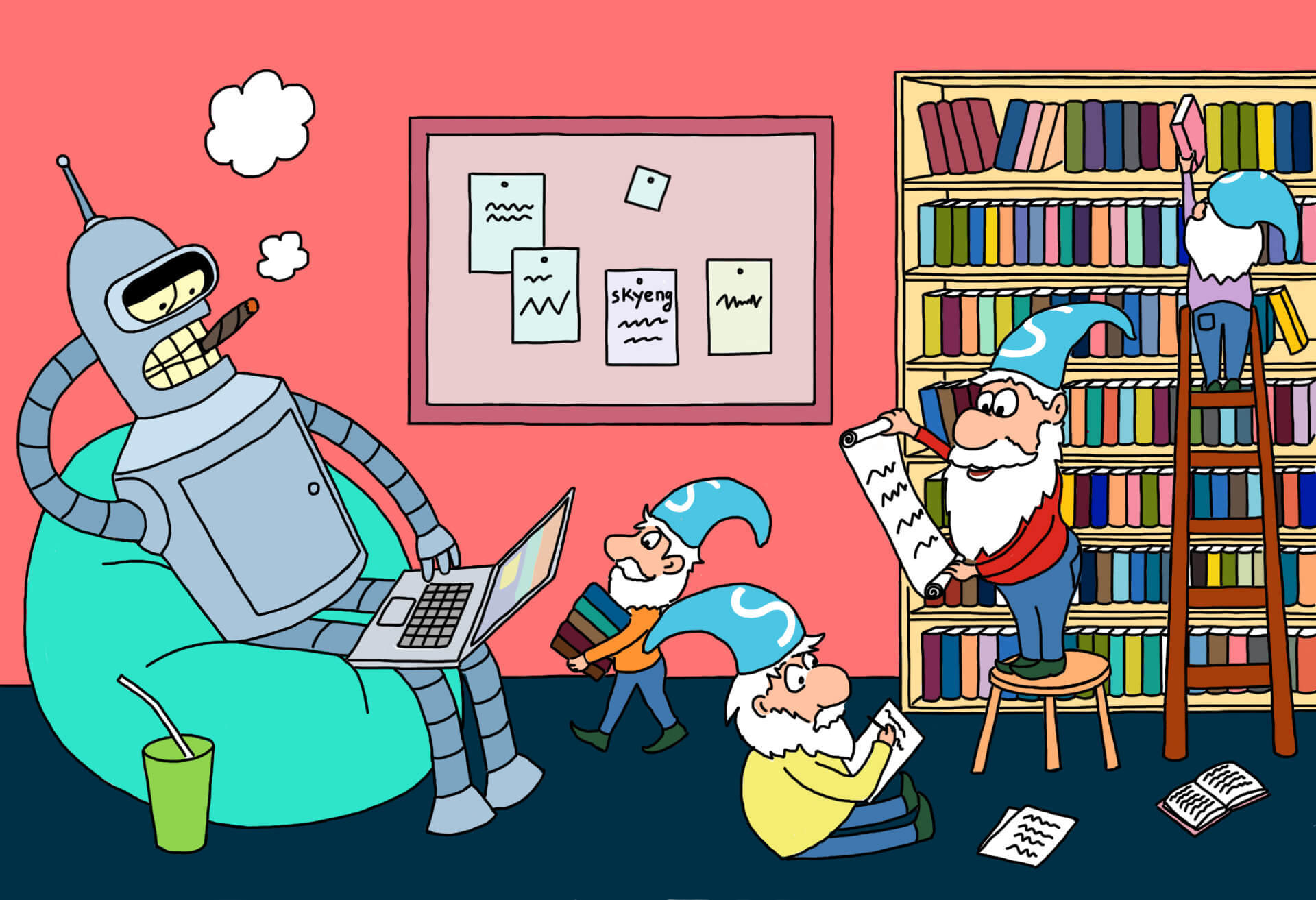
Skyeng School has an extension for web browsers “Vimbox Translator”, which can translate English texts of web pages into Russian. At first glance, there is nothing special about this, and such services are a dime a dozen, but in reality this thing is very important for the school's ecosystem, and we hope that it will be useful not only for our students, but also for outside users. Today we will tell why we think so, how we developed this extension, what it can do and what its team is working on at the moment.
Plenty of plans
An extension for Chrome and Safari (Firefox and Opera until they are up) existed in our plans for a very long time. But the first question that arose before the development team finally assembled was “why?”. We didn’t want to do “one more extension-translator”, we needed to invent some kind of our own chip.

')
Therefore, we have developed an extensive roadmap with a classic set of iterations, customer development, development plans, a description of unique features that complement the translation. The most important of them, originally conceived, is synchronization with our mobile application, the ability to add words for study directly from the browser. However, at the time of product design, we had an understanding that the ecosystem of our school is still closed, and interest around the product and the company is growing. We wanted to make a way out to people whom we are interested in, but who do not have the opportunity to study at school.
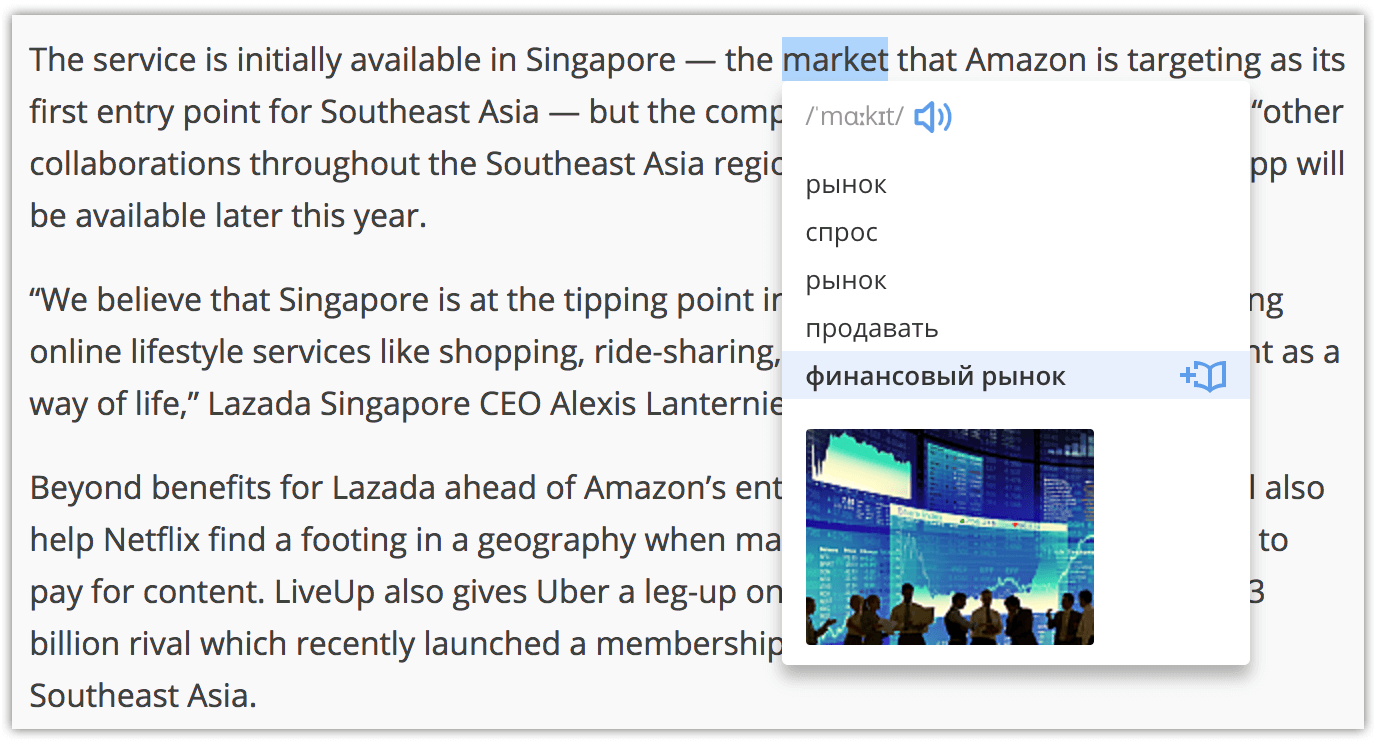
The development was divided into three stages. The first step is to create a basic word translation tool that is not overloaded with functionality. At the second stage, we planned to come up with the mechanics of engaging the user in the learning process, some kind of demonstration that learning English is great. So we wanted to push the user to authorize and connect advanced functionality. Well, the third stage is the conversion of the user into the student of the school.
A detailed concept was developed, a description of the functional for each stage, and it seemed to us that it should fire.
Return to earth
However, when we began to expand and analyze conversion funnels of related products, it became obvious that attracting new school customers through this product is a very trivial task: the conversion is very small, and the goal is too ambitious. Therefore, having already begun work on the project, we decided to shift the focus, simplify the mechanics, throw out steep but not obvious chips, and make a simple and understandable extension that would be beneficial in the first place to school students; we want them all to install it. Although external users can also use the extension, we have ceased to rely on them as potential students of the school.
Here the story was simplified, but at the same time it was clear that, starting from the basic functionality, we would not bring anything new to the market; it will be difficult for us to compete with peers, even with a loyal audience. Therefore, it was relied on the integration with the mobile application, the benefit is our unique advantage: none of the competitors have such a set of mechanics to memorize words.
At the same time, we began to think not only about basic tasks, but tried to find a more fundamental approach, to look at our product in the context of its consumption. What else might be needed for a user working with textual information? This fundamental reflection led to the concept of symbiosis of additional services, which should help us create a unique product.
And we started to invent these services.
Secret sauce
The first of these was the readability mode, in which all excess garbage, banners, side columns, and so on are thrown out of a web page. Only useful content remains: text, illustrations, video. The menu has visual display settings - fonts, colors; ibid - deeper mechanisms of interaction with interactive translation. This mode is intended primarily for comfortable reading and translation of English texts: the translation of all added words is displayed in the text, there is a sidebar with a local dictionary specifically for this article and other options for working with the source. We plan to continue to actively develop the functionality of this service.

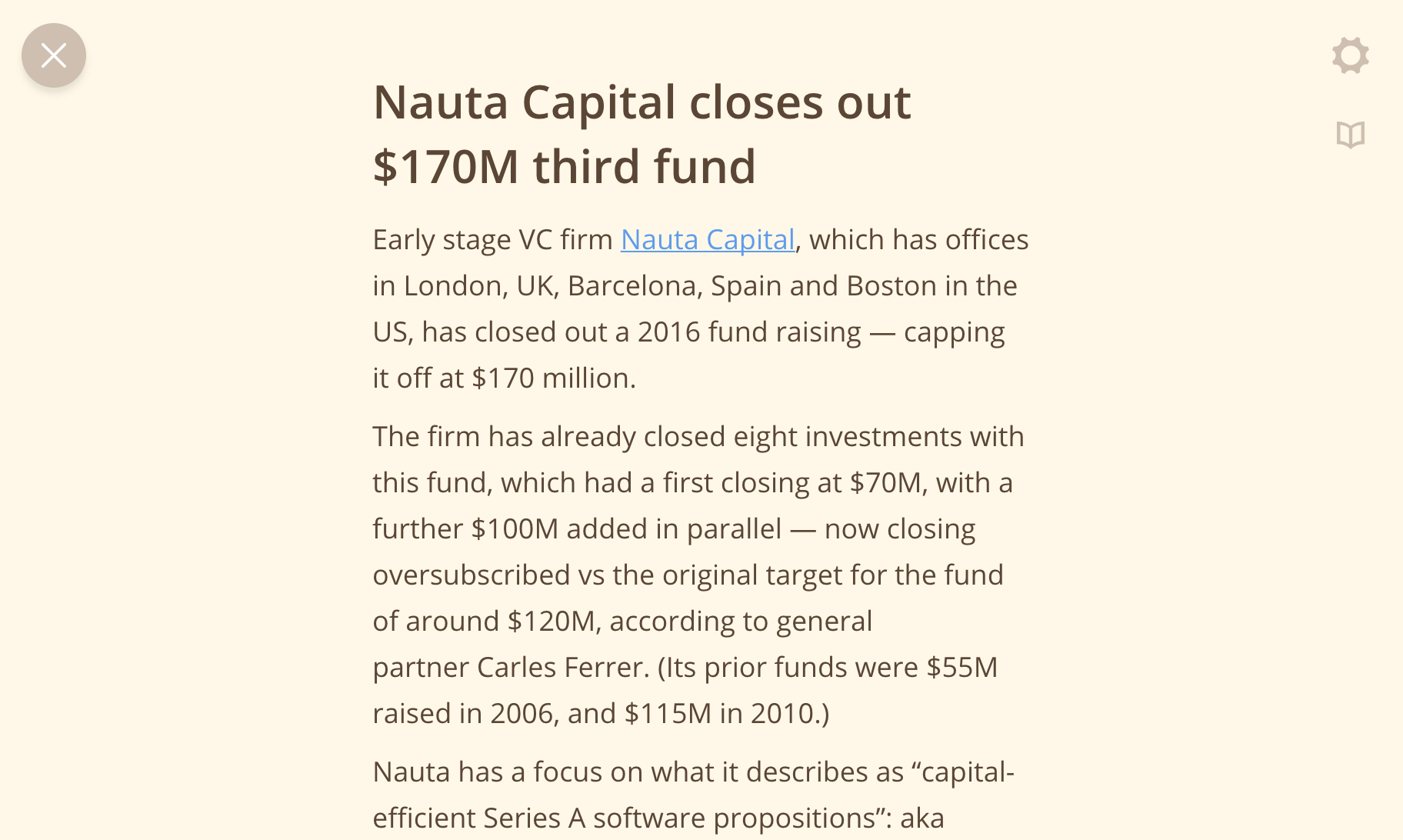

Further, we thought that reading in English is a time-consuming task, requiring time and effort, which leads to problems with quality control of the flow of information. We came up with a cool example - bookmarks (bookmarks) and applications for deferred reading. Why not make your own virtual bookmark system based on our application? We can provide the user with a repository where he can drop articles from the network, read or planned to be read. Articles are structured by meta tags, statistical information is added to them, useful for language learners - how much time was spent reading the text, how many words were added to the dictionary to learn, how much the text turned out to be difficult to understand - here we see a lot of possibilities from near and far perspectives, very we hope to realize everything.
Finally, the whole story of collecting information about the interaction of the user with the text perfectly falls on the system of recommendations. If we understand what it reads and how, we can recommend analogs on the subject, content, level of complexity, to consolidate the words learned, etc. etc. We know the level of the student, we know what he reads, what he added to the dictionary, we can compile his thesaurus, on the basis of which, when opening an article, we can provide him with a summary of the words that he will cause problems with understanding. Thus, we improve its interaction with the text and increase the effectiveness of the actual learning. For us, this is the most promising direction of development - we will improve the student's process of working with text and increase the usefulness of this work, rather than just polishing the interaction with the dictionary.
Expansion and Ecosystem
The browser extension is part of the Skyeng ecosystem. Ecosystem, to put it bluntly, is one user profile in different services, which can be anything where English participates and have the opportunity to improve his knowledge: our Vimbox platform, our mobile applications, some third-party development - even online cinemas, even computer games. The heart of the data and functionality of these services is a common dictionary, which we plan to synchronize and keep in the backend of the mobile application (the dictionary is a fairly conventional simplified concept, in fact, the entire experience of interacting with the text is taken into account). All applications collect words in this dictionary. There can be any number of services, they can be implemented on different platforms in different contexts, but everywhere you can add words to the general dictionary. We have plans - a lot of ideas for personalization, adaptation, immersion.
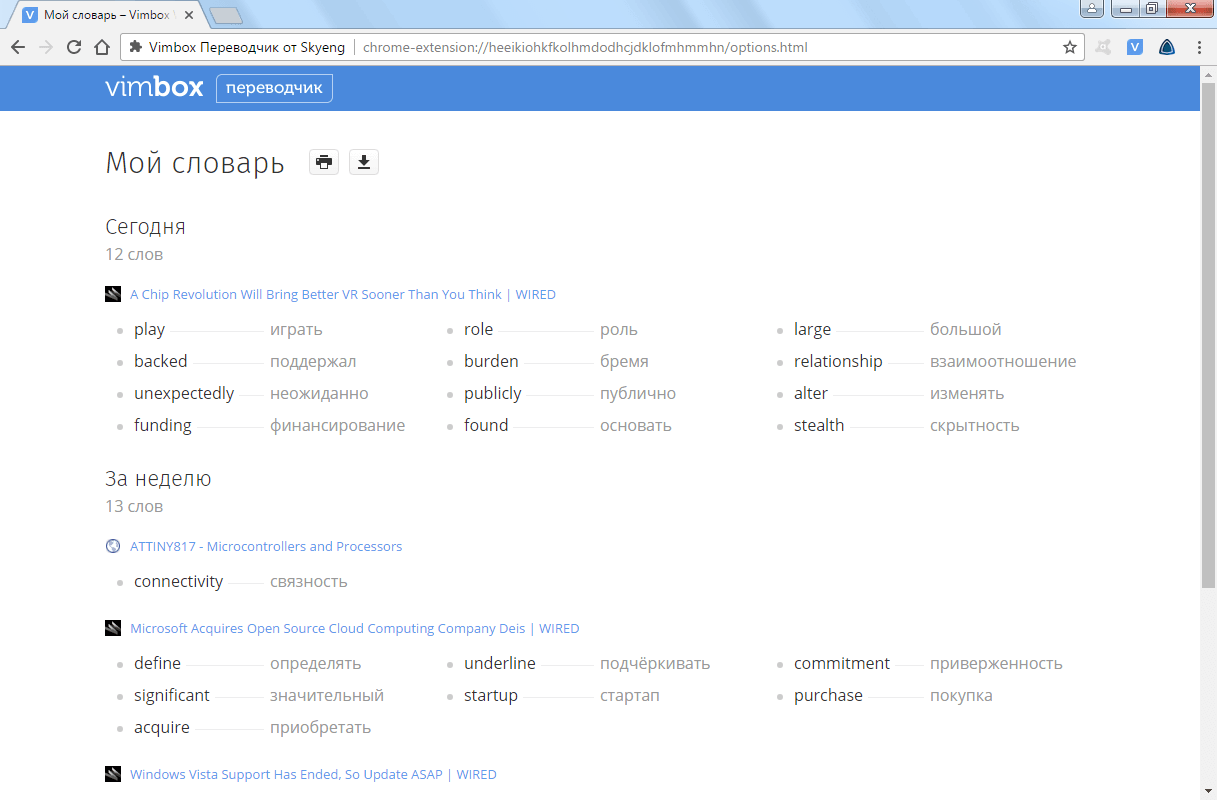
Now the extension is able to define parts of speech, has learned to work with regular expressions. The grammatical translation currently uses semantics from Google, but in the future everything will depend on the capabilities of the central Wimbox dictionary.
The general idea is that the deeper the user sinks, the more elements of the ecosystem he uses in his account, the more he gains in learning English. Now an account can have not only a student of the school. A deferred list of words will be tied up for authorization and stored in the cloud: you can add a word on a computer at work, and learning from a phone at home is seamless integration.
Zoo and prospects
It is clear that our expansion is not quantum physics. From the client side, everything was clear from the beginning - they took the dictionary API, made an extension, made friends. When they started to do synchronization, problems got in the way.
We (the extension development team) saw our project as a full-fledged backend with history, meta-information on user actions; we assumed that directly from the extension it would be possible to supply sets of words to any services of the Skyeng ecosystem. Everything turned out differently: the backend was managed by the mobile development team, and now this whole dictionary backend is an entity that sits very tightly in the mobile application. There were incidents and conflicts in the implementation of dynamic work and authorization. We thought that the user would be able to make changes on any client, but, faced with reality, we realized that now it is impossible to do this: changes can only occur in our extension, because The mobile application only deals with viewing the database. This is a new experience, a new interaction architecture with a cloud dictionary, and a new task for the mobile team. They will need to learn how to deliver flexible tools to the user, so that the mobile application is no longer just a viewer, and allows you to fully work with the data: change pictures, move words, edit sets - these tasks were formulated based on the results of our collaboration related to the extension.
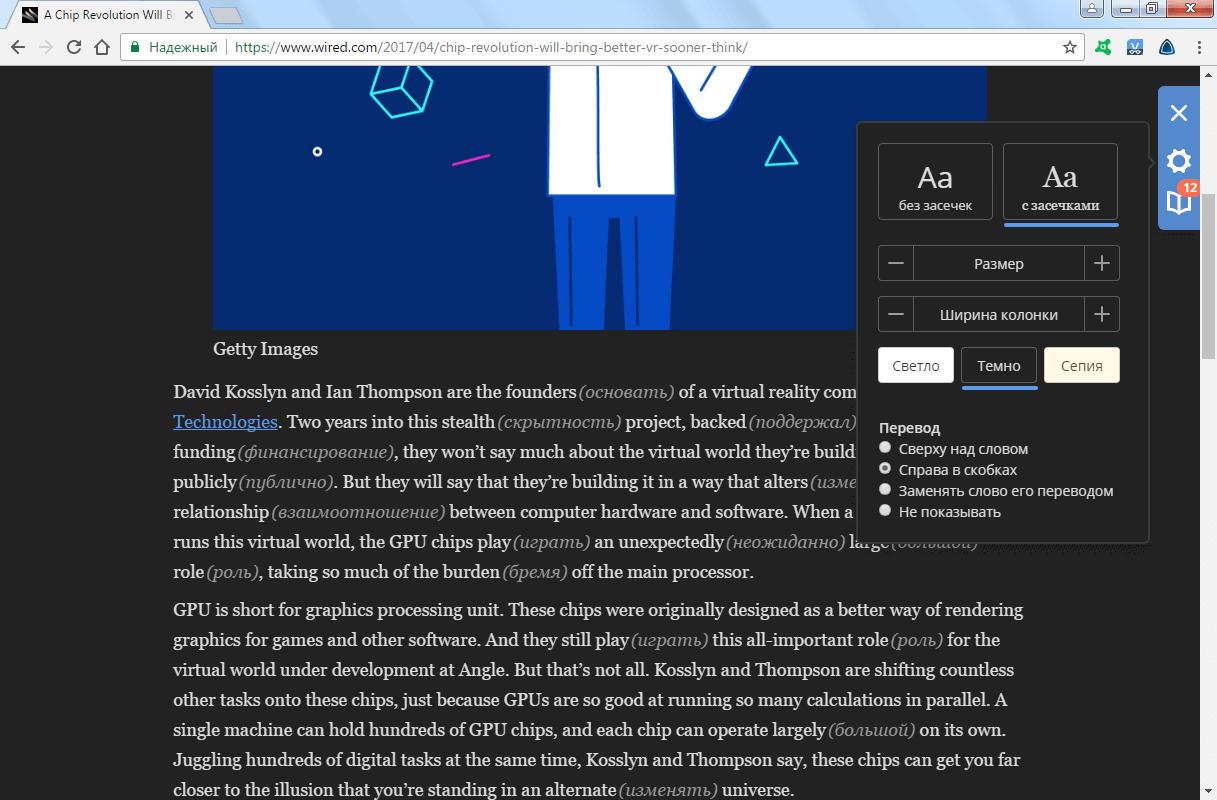
When we made an internal test version without authorization and distributed it to employees to study basic usage scenarios, we saw that the local dictionary page is not informative: the user sees just a set of words indicating where they are added from. We began to communicate with colleagues, find out who uses them, and identified two patterns: someone is interested in printing lists of words and hanging them on the wall, while others prefer to upload to other data formats and drive them somewhere. We quickly made two buttons, now the personal dictionary page can be printed or unloaded as a CSV. This is a quick reaction to the first feedback.
We started testing at school audiences - everyone seems to like everything, there are no global jambs, but people have an urgent need for self-editing of sets that are generated automatically. If you add two words from the article, you will get a set of two words, it is inconvenient to teach him, they asked for the ability to combine sets, edit, break. It is clear that such functionality is very much in demand, and its implementation is our main current task; We are rolling out the dictionary editor today, the server for storing deferred texts will appear in the expansion in the coming weeks.

As always, we remind you that we are constantly evolving and are actively looking for cool employees in our development teams. For example, several full-stack (including lead ) vacancies and a product designer on Vimbox are now open. You can work remotely, and it will be possible in our new office on Taganka!
Source: https://habr.com/ru/post/326802/
All Articles